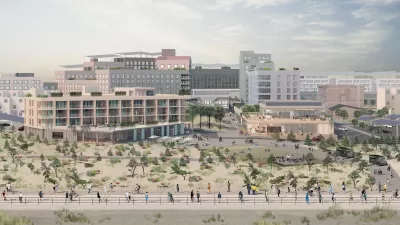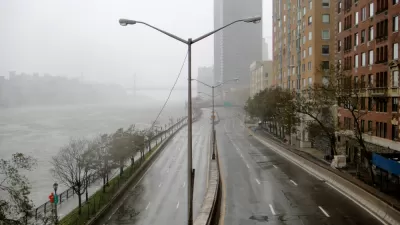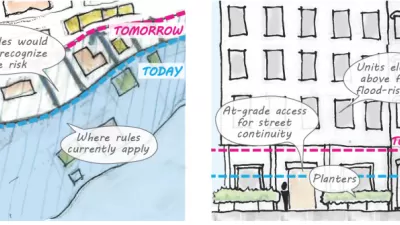A massive project underway in Lower Manhattan seeks to protect the shoreline from future flooding and mitigate the effects of climate change and rising sea levels.

Writing in Bloomberg CityLab, Patrick Sisson reports on efforts to protect Battery Park City from catastrophic flooding like the kind that devastated parts of New York during Hurricane Sandy. As Sisson writes, local residents want authorities to remember that “amid the high-rises, there’s a real neighborhood here in this low-lying area at the southern tip of Manhattan, with roughly 16,000 full-time residents and its own Little League.”
Now, the Battery Park City Resiliency Project is working to prevent similar floods and bolster the coastline against future threats. “With global design firm AECOM working as lead architect and engineer, the project amounts to a wholesale reconstruction of the already artificial Battery Park City — 92 acres created from soil and rock dug during the construction of the World Trade Center.”
The project is part of the Lower Manhattan Coastal Resiliency plan, a broader effort to protect the city in the wake of Hurricane Sandy. The article describes the various approaches that will be taken to address flood risks in different areas of the shoreline, with many of them doubling as public parks and amenities. Some areas will be protected by flood walls, while others will be built to withstand flooding with water-resistant materials and plants that can survive being submerged.
“The project is a rare exception, in many ways. The Battery Park City Authority can leverage bond funding and coordinate the endeavor in ways other local government entities can’t. It’s an example of an empowered local government entity in a wealthy neighborhood tackling rising water with immense financial resources.” But while not all communities may have the resources the Battery Park City Authority does, the project holds lessons for other climate resilience projects. “Ideally, [Thad Pawlowski, a professor and managing director at Columbia University’s Center for Resilient Cities and Landscapes] sees this raising the standard, and helping other neighborhoods — such as Red Hook in Brooklyn or Hunt’s Point in the Bronx, which don’t have Battery Park City’s resources and face some of the highest risks from climate change — demand and receive more.”
FULL STORY: Behind a Billion-Dollar Bid to Save Lower Manhattan

Maui's Vacation Rental Debate Turns Ugly
Verbal attacks, misinformation campaigns and fistfights plague a high-stakes debate to convert thousands of vacation rentals into long-term housing.

Planetizen Federal Action Tracker
A weekly monitor of how Trump’s orders and actions are impacting planners and planning in America.

In Urban Planning, AI Prompting Could be the New Design Thinking
Creativity has long been key to great urban design. What if we see AI as our new creative partner?

King County Supportive Housing Program Offers Hope for Unhoused Residents
The county is taking a ‘Housing First’ approach that prioritizes getting people into housing, then offering wraparound supportive services.

Researchers Use AI to Get Clearer Picture of US Housing
Analysts are using artificial intelligence to supercharge their research by allowing them to comb through data faster. Though these AI tools can be error prone, they save time and housing researchers are optimistic about the future.

Making Shared Micromobility More Inclusive
Cities and shared mobility system operators can do more to include people with disabilities in planning and operations, per a new report.
Urban Design for Planners 1: Software Tools
This six-course series explores essential urban design concepts using open source software and equips planners with the tools they need to participate fully in the urban design process.
Planning for Universal Design
Learn the tools for implementing Universal Design in planning regulations.
planning NEXT
Appalachian Highlands Housing Partners
Mpact (founded as Rail~Volution)
City of Camden Redevelopment Agency
City of Astoria
City of Portland
City of Laramie





























